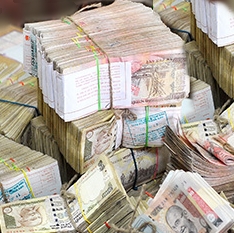Banks flush with funds as 2-day deposits top Rs60,000 crore
12 Nov 2016
Banks across the country saw nearly Rs60,000 crore in fresh deposits in the two days following the scrapping of the Rs1,000 and Rs500 currency notes. Bankers expect the surge in deposits to continue for some more time, putting pressure on deposit rates.
 Top lender State Bank of India (SBI) received about Rs39,677 crore in deposits in the two days following the government's decision to withdraw high denomination notes from circulation. The state-run bank said it collected as much as Rs11,000 crore in savings deposits in one day against a monthly average collection of Rs8,000 crore in savings deposits.
Top lender State Bank of India (SBI) received about Rs39,677 crore in deposits in the two days following the government's decision to withdraw high denomination notes from circulation. The state-run bank said it collected as much as Rs11,000 crore in savings deposits in one day against a monthly average collection of Rs8,000 crore in savings deposits.
"We have received deposits of Rs11,000 crore in savings accounts in one day. Normally, it takes a month to mobilise Rs8,000 crore of savings deposits," said SBI chairman Arundhati Bhattacharya, while announcing the results on Friday.
Household bank deposits from small towns and rural pockets exceeded expectations, even as banks struggled to replenish branches and ATMs with fresh cash.
On Thursday alone, Kolkata-based UCO Bank received Rs2,500 crore as cash deposits. Of this, Rs1,300 crore, or more than half, came from rural and semi-urban areas, according to Ravi Krishan Takkar, managing director and chief executive, UCO Bank.
At another Kolkata-based lender, United Bank of India, total cash collection on Thursday was close to Rs1,700 crore.
Banks' deposit collections on Thursday stood at Rs22,150 crore while on Friday it was Rs17,527 crore.
On the other hand, disbursals by way of currency swaps at SBI alone stood at Rs723 crore on Thursday and Rs943 crore on Friday.
A rise in savings deposits will bring in cheap funds for banks, which could translate to lower lending rate, according to Bhattacharya. But, she said it would also have a deflationary impact on the economy.
Although a large chunk of the deposits are expected to be withdrawn, bankers say that demonetisation would lead to a sustained reduction in the use of cash. The increase in bank deposits would also lead to a reduction in bond yields and interest rates in the money market.
The public, including government agencies are expected to offload Rs14,000 crore in Rs1,000 and Rs500 notes on banks, which could pressure interest rates in the transition period ending 30 December. Banks will face the heat at least until all these are converted into fresh money.
Deposits of old notes at rural branches stood close to Rs1 crore per branch, while in one or two rural branches, deposits even touched Rs5 crore.
Meanwhile, with the new Rs2,000 note requiring reconfiguration of ATMs to dispense currency, several remained shut.
Banks also expect a big boost to the zero-balance accounts opened under Pradhan Mantri Jan-Dhan Yojana, with the flow of deposits in the form of household savings in rural areas. As of 2 November, percentage of zero-balance accounts opened under the scheme was close to 23 per cent, while the total deposits stood at Rs45,302 crore.
Banks, meanwhile, have been asked to keep a watch for suspicious transactions, including multiple deposits and high-value deposits into accounts of those belonging to the lower-income group and report them to tax authorities.



















